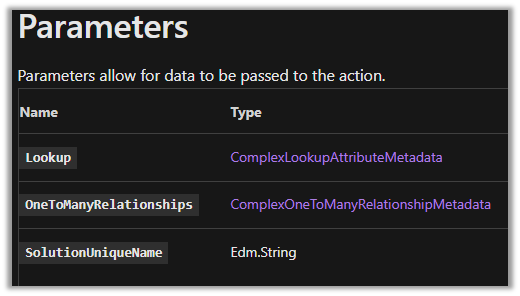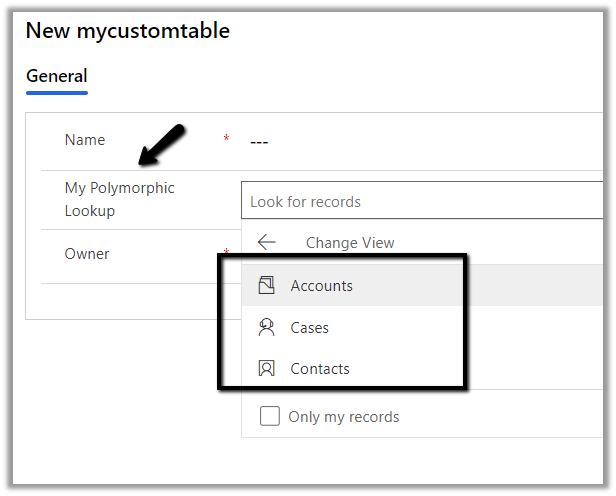For creating multi-table lookup we already have an XrmToolBox plugin Polymorphic Lookup Creator which we should be using ideally, but in case somebody wants to try it out, the below shared sample code can be referred.

Below is our custom table named mycustomtable to which we’d add a multi-table lookup which references case, contact and account entity.

We need to call CreatePolymorphicLookupAttribute Action, which expects 3 parameters

Below is the sample code to create the polymorphic lookup.
string ConnectionString = "AuthType = OAuth; " +
"AppId=51f81489-12ee-4a9e-aaae-a2591f45987d; " +
"Username=user@domain.onmicrosoft.com; " +
"Password=pwd; " +
"RedirectUri=app://58145B91-0C36-4500-8554-080854F2AC97;" +
"Url = https://orgname.crm4.dynamics.com/;";
CrmServiceClient svc = new CrmServiceClient(ConnectionString);
if (svc.IsReady)
{
// Create PolymorphicLookupAttribute
// with mycustomtable custom entity / table
// referencing case, contact and account entity
var varOrgRequest = new OrganizationRequest();
// specify the request name
varOrgRequest.RequestName = "CreatePolymorphicLookupAttribute";
// specify lookup attribute details
varOrgRequest.Parameters["Lookup"] = new LookupAttributeMetadata()
{
SchemaName = "crf82_mypolymorphiclookup",
DisplayName = new Label("My Polymorphic Lookup", 1033)
};
// referencing entity is our custom entity named my custom table
// referenced entity is incident
var oneToManyRelation1 = new OneToManyRelationshipMetadata();
oneToManyRelation1.ReferencingEntity = "crf82_mycustomtable";
oneToManyRelation1.ReferencedEntity = "incident";
oneToManyRelation1.SchemaName = "crf82_mycustomtable_crf82_incident";
// referencing entity is our custom entity named my custom table
// referenced entity is contact
var oneToManyRelation2 = new OneToManyRelationshipMetadata();
oneToManyRelation2.ReferencingEntity = "crf82_mycustomtable";
oneToManyRelation2.ReferencedEntity = "contact";
oneToManyRelation2.SchemaName = "crf82_mycustomtable_crf82_contact";
// referencing entity is our custom entity named my custom table
// referenced entity is account
var oneToManyRelation3 = new OneToManyRelationshipMetadata();
oneToManyRelation3.ReferencingEntity = "crf82_mycustomtable";
oneToManyRelation3.ReferencedEntity = "account";
oneToManyRelation3.SchemaName = "crf82_mycustomtable_crf82_account";
// populate OneToManyRelationships parameter of CreatePolymorphicLookupAttribute request
varOrgRequest.Parameters["OneToManyRelationships"] = new OneToManyRelationshipMetadata[]
{
oneToManyRelation1, oneToManyRelation2, oneToManyRelation3
};
// specify the existing solution name
varOrgRequest.Parameters["SolutionUniqueName"] = "MySolution";
var response = svc.Execute(varOrgRequest);
}
The lookup à


Sample code to add a new relationship to an existing lookup.
var createOneToManyRelationshipRequest = new CreateOneToManyRequest();
// referencing entity is our custom entity named mycustomtable
// referenced entity is contact - add the entity to be added
var oneToManyRelationAdd = new OneToManyRelationshipMetadata();
oneToManyRelationAdd.ReferencingEntity = "crf82_mycustomtable";
oneToManyRelationAdd.ReferencedEntity = "contact";
oneToManyRelationAdd.SchemaName = "crf82_mycustomtable_crf82_contact";
createOneToManyRelationshipRequest.OneToManyRelationship = oneToManyRelationAdd;
// specify lookup attribute details to which new relationship is to be added
createOneToManyRelationshipRequest.Parameters["Lookup"] = new LookupAttributeMetadata()
{
SchemaName = "crf82_mypolymorphiclookup",
DisplayName = new Label("My Polymorphic Lookup", 1033)
};
var createOneToManyRelationshipResponse = svc.Execute(createOneToManyRelationshipRequest);
Sample code to remove relationship from an existing lookup.
var deleteRelationShip = new DeleteRelationshipRequest();
// specify schema name of the relationship
deleteRelationShip.Name = "crf82_mycustomtable_crf82_contact1";
svc.Execute(deleteRelationShip);
Sample code to delete the lookup
// User delete attribute request
DeleteAttributeRequest varDelRequest = new DeleteAttributeRequest();
// specify the entity name
varDelRequest.EntityLogicalName = "crf82_mycustomtable";
// specify the schema name of the entity
varDelRequest.LogicalName = "crf82_mymultitablelookup";
svc.Execute(varDelRequest);
Get all the details here –
Hope it helps..


Hi,
I have added one polymorphic lookup “serviceid” using polymorphic lookup manager tool from xrm toolbox then i tried to import solution in different environment but i’m getting error of missing dependency with “serviceidtype” field.
Can you help me with that?
LikeLiked by 1 person
Had the same issue. The xrm toolbox plugin somehow adds the relationships incorrectly to the selected solution, but there is a work around. If you remove and re-add the relationships and the field to the solution – then export, there are no issues re-importing the solution after that.
LikeLike